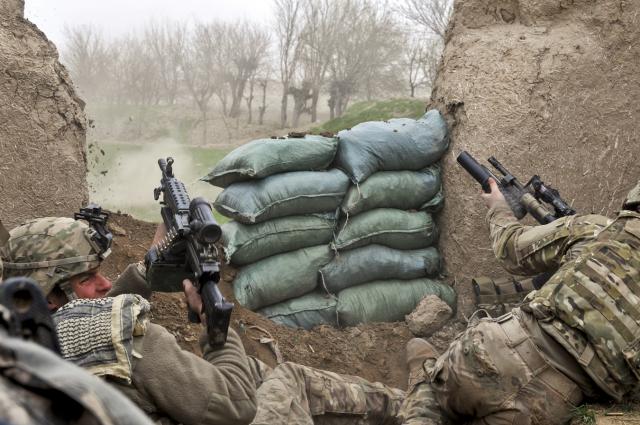Fix Rules Of Engagement For Afghanistan Fight: Rep. Joe Wilson
Posted on

This is the first of our monthly op-eds by Rep. Joe Wilson, chairman of the House Armed Services subcommittee on emerging threats and capabilities. Dear readers, if you’ve got unique and useful topics you think Rep. Wilson should address, please let us or his office know. Read on. The Editor.
Despite the Taliban clearly still being at war with U.S. troops and taking every effort to overthrow the democratically elected government in Afghanistan, our soldiers face contradictory, inconsistent and politically driven rules of engagement.

Rep. Joe Wilson
On November 12, 2016, a suicide bomber attacked a NATO air base in Afghanistan—killing four Americans. It was one of the worst attacks against U.S. forces in Afghanistan, and the first time a bomb exploded inside Bagram Air Base. Shortly after, the Taliban claimed responsibility.
This attack follows other recent attacks against U.S. personnel in the region, including one when two Special Operations personnel were killed at the beginning of November in Kunduz province and a suicide attack last year that killed six American service members.
These attacks are a sober reminder that 15 years after the terrorist attacks of September 11, 2001, we remain at war with the Taliban in the Global War on Terrorism.
Shortly after those murderous attacks, Congress, upon the request of President George W. Bush, passed an authorization for the use of military force against those who “planned, authorized, committed, or aided” the September 11th attacks. The 2001 AUMF clearly provides authorization for combatant commanders to continue targeting the Taliban, especially as they attack U.S. personnel and seek to undermine democracy in the region.
Last February, our combat mission in Afghanistan ended—replaced with a mission to assist and train Afghan troops. However, as the Taliban grows increasingly aggressive, trying to take control over the lucrative heroin fields in Helmand and expanding their control to 28 percent of districts across Afghanistan (more than any point since 2001), our service men and women continue to conduct counterterrorism missions in support of our Afghan allies. Yet, when they do so, they are unable to unilaterally take the fight to the Taliban. They are restricted to waiting until Afghan troops initiate a strike.
Commanders need the ability to engage in ground operations—the ability for the U.S. to engage in an offensive, direct combat strike regardless of whether or not it is initiated by our Afghan partners. We need to restore the authority for US commanders to win the fight, in a manner they see fit. I know first-hand about our military capabilities since my youngest son, Hunter, served for a year as an engineer in Afghanistan.
Ensuring a stable Afghanistan is critical to protecting American families. Or have we forgotten how a Taliban-ruled Afghanistan allowed Osama bin Laden a safe haven to plan and execute the September 11 attacks? We know too well that terrorist safe havens, wherever they stand, threaten American families and our interests around the region. Today, the Taliban continue to provide support to terrorist organizations, such as the Haqqani Network in Pakistan, that target Americans and pro-democracy forces.
A thriving and stable Afghanistan is also crucial to our ability to protect American families by effectively destroying Daesh (aka the Islamic State of Iraq and the Levant) and enhancing our ability to check the regional power of the Islamic Republic of Iran, a country bent on the destruction of Israel and America. Iranians still chant, “Death to America, Death to Israel.”
In September, I introduced House Resolution 920, a resolution that would place trust and discretion for combat operations with our military commanders. Life and death decisions should be made by those on the ground—not those engaged in a politically correct war in Washington. I’m not alone in my advocacy—retired Gen. David Petraeus has been an outspoken supporter of increasing air strikes against the Taliban. Clearly, we both agree that our soldiers in Afghanistan should have the resources and mission clarity they need to carry out their mission.
I plan to re-introduce my legislation on Afghanistan in the next Congress, and I look forward to working with the Trump Administration in January. President-elect Trump has pledged to take the fight to the enemy and to stop terrorism overseas. Clarifying the rules of engagement in our fight against the Taliban would be a strong and effective place to start.
Subscribe to our newsletter
Promotions, new products and sales. Directly to your inbox.
